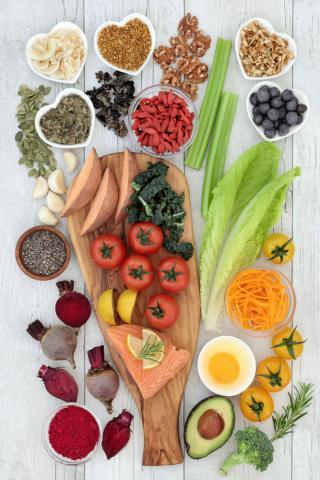
While it is trendy to jump on the Keto, Paleo, or Atkins Diet, is it really worth it? Do you find restricting your diet or limiting what you can and cannot eat difficult to maintain over long periods of time? What would happen if you didn't conform to a specific meal plan but rather became mindful about what foods you put into your body and what effect they have on you, from increased inflammation to boosting or hindering your energy?
There is no denying it: there is a societal pressure to be one type of skinny, but let's face it, we are individuals and there will never be a one-size-fits-all diet plan able to suit everyone's needs. That is why taking a no-diet approach and building a healthy lifestyle based around becoming conscious of how certain types of foods cause specific reactions is most practical and will promote results that are sustainable for the long term.
It is not always easy to identify what is right for you when it comes to healthy eating. Research reports are conflicting on nutrition and how to be healthy. For example, if you did an online search about coconut oil or butter for that matter, you would find advocates stating differing views. Eggs were once bad for you and now they’re good—or are they? It is hard to know who to believe. Fortunately, nutritious eating and living a sustainable healthy lifestyle doesn’t have to be so confusing! Taking a non-diet approach looks at integrating mindful and intuitive eating strategies into your daily life that include listening to your body and how it feels when making food choices, while not restricting yourself completely from foods you enjoy. It also encourages educating yourself through reputable sources on the basics of nutrition. The goal is to build a healthy relationship with food that will last a lifetime and make food more about relishing the experience rather than a chore or lowly fuel for survival.

As unique individuals, there are numerous factors that contribute to our overall health and wellness, helping us operate at the peak of performance. These factors include, but are not limited to, diet, exercise, stress, time, family, and career. Taking a mindfulness approach to eating helps us stay in the present moment rather than allowing the nourishment of our bodies to become another menial task that we unconsciously take on during the day. Using mindfulness as a means to creating a sustainable lifestyle takes the philosophy one step further in helping us live our best lives by implementing tools that will help us identify food preferences and habits and create new ways of being that will set in practice moderation and focused eating.
Determining what works and what doesn’t work for you is based around the awareness you have for your body and how it feels. Education is a key component. Acknowledging how certain foods can either help or hinder your success will determine your outcome. Take the time and become curious about food and how everything from apples to olives has a different purpose, from strengthening our vision to aiding in digestion. We can build awareness and implement certain practices that will lead us down the right path.
Where we are right now is a product of years of conditioning. It is important to remember that we are building longevity, a way of being for a lifetime, and it will come with success and failure. Reconditioning and changing our mindset from past practices that no longer serve us well will take time. Don’t judge yourself. Accept that most days you will eat healthy and some days you may slip. Just keep going. Over time you will create new habits that will replace the old and it will not take a concerted effort to be mindful, but rather it will become a part of you.
Implementing these 7 helpful practices and focusing on whole foods rather than processed products will dramatically change your relationship with food for the better.
7 Mindfulness Practices You Can Start Today
1. Reflect
Become aware of how you feel. If you are not where you want to be, ask yourself: how would you like to feel? With your answer in mind, start taking notes about your normal diet. How do certain foods make you feel: bloated, heavy, light, energetic? As your list gets longer and longer gravitate to those foods that promote the best version of you. Eat from all the food groups and make sure you stay hydrated.
2. Sit Down & Be Fully Present
Being conscious in the here and now is very important. So often we are in our head thinking about the past or planning for the future that we miss out on life as we walk through. When you ground yourself in the present moment you make more mindful choices and act less on impulse or urges.

3. Turn Off Distractions
In the same line of being fully present, power down your mobile phone or turn off the television. Taking away distractions forces us to look at the plate in front of us and tap into our bodies. Notice the sensations, tastes, smells, textures, temperatures, and presentation, and relish in the food experience. With practice you will tune into your body’s triggers, noting when you feel full, when you are merely bored, when you are actually hungry, what you are hungry for, and any addictions you may need to break.
4. Start with a Smaller Plate
Play a trick on the mind. Use a smaller plate, fill it full, and see how you react when you consume your meal. When you start small, you have time to check in and see if you truly need seconds or if you are content.

5. Chew 25 Times
Shooting for the goal to chew every bite 25 times will help you slow down at the dinner table. Now whether chewing 20 or 30 times is necessary every bite, having a figure in mind helps you become aware of the foods you are consuming and allows the mind and the stomach time to communicate. This act of communication can help curb overeating or mindless eating.
6. Put Down Your Utensils
While many would suggest putting down your utensils after every bite, it is more practical to suggest taking the time to do so after every few bites. The act of doing this helps you to stay fully present, slow down and engage in the entire dining experience from entering in conversation to tapping into your senses. (Or you could skip utensils and eat with your hands!)
7. Forfeit the Clean Plate Competition
I had a grandfather that would not let me leave the table without fully clearing my plate. There would be times I would have to sit there until well after my grandfather went for his afternoon nap, and my grandmother would kindly dismiss me with a few peas still remaining. If you grew up like me, we need to reprogram our psyche that devouring every last crumb is not necessary—especially in the United States where portion sizes when dining out at your favorite restaurant could easily serve two or three meals. It is irrational to consume that many calories in one sitting. Take it home, wrap it up, share with someone—just don’t feel obligated to lick the plate.








